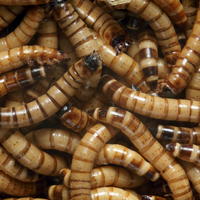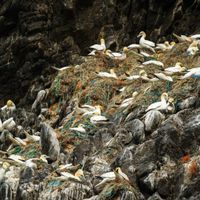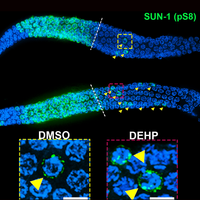plastics

Garbage to Guts: The Slow-Churn of Plastic Waste
Iris Kulbatski, PhD | Mar 13, 2023 | 4 min read
The winding trail of environmental microplastics is leading researchers to the human digestive ecosystem.

How to Get Started Sustainably
Eppendorf and Promega | Mar 1, 2023 | 1 min read
For new researchers, there is no better time than laboratory start-up to prioritize lab processes that protect the planet.

The Constellation of Creatures Inhabiting the Ocean Surface
Amanda Heidt | Jan 2, 2023 | 10+ min read
The myriad species floating atop the world’s seas, called neuston, are mysterious and understudied, complicating efforts to clean up plastic pollution.

Neuston: Living Among Plastic Debris in the Open Ocean
Amanda Heidt | Jan 2, 2023 | 3 min read
With plastic recovery operations now underway in the world’s marine garbage patches, scientists must contend with how little was known about the organisms living at the surface.

Infographic: Neuston Drift Atop the World’s Oceans
Amanda Heidt | Jan 2, 2023 | 1 min read
The sea surface is home to a diverse group of animals adapted to life in the open ocean, but increasingly, they’re sharing that space with plastic debris.

Green Lab Initiatives Take Root Around the World
Natalia Mesa, PhD | Nov 14, 2022 | 9 min read
Scientists, students, and administrative staff are working to bring about a cultural shift to mitigate the impact of research on the environment.

Plastic Pollution Boosts Bacterial Growth in Lake Water
Patience Asanga | Jul 26, 2022 | 3 min read
A study finds that not only did aquatic bacteria thrive when chemicals washed from degrading plastic were introduced into lake water, they also broke down organic matter more efficiently.

Microplastics in Seawater May Harbor Parasites
Christie Wilcox, PhD | Apr 26, 2022 | 2 min read
Laboratory experiments find that Toxoplasma, Cryptosporidium, and Giardia can congregate on microplastic beads and fibers, suggesting they might make their way into and around the world’s oceans by hitching rides on tiny bits of trash.

Book Excerpt from Thicker Than Water
Erica Cirino | Oct 1, 2021 | 4 min read
In Chapter 5, "Pick Up the Pieces," author Erica Cirino investigates the potential health risks of the small plastic particles that permeate the planet.

Opinion: Plastic Pollution May Endanger Brains
Erica Cirino | Oct 1, 2021 | 3 min read
Plastic waste pervades every ecosystem on Earth and is likely affecting neurobiology as well.

Labs Worldwide Still Struggling Amid Broken Supply Chains
Katarina Zimmer | May 21, 2021 | 8 min read
Countries outside the US and Europe that are already used to long wait times for laboratory supplies are facing greater research disruptions than ever during the pandemic.

Baby Bottles Can Shed Millions of Microplastic Particles: Study
Max Kozlov | Oct 19, 2020 | 5 min read
The project did not assess any implications for children’s health, but the authors recommend changing up how parents use baby bottles to reduce the amount of plastic in formula or breastmilk.

Beetle Larvae Can Survive on Polystyrene Alone
Nayanah Siva | Mar 11, 2020 | 4 min read
Also known as superworms, the scavengers are able to digest the plastic, opening up the possibility of harnessing their abilities to help tackle our pollution crisis.

Image of the Day: Plastic Nests
Amy Schleunes | Mar 3, 2020 | 1 min read
Seabirds in Norway use fishing debris to construct nests.

Image of the Day: Impaired Meiosis
Amy Schleunes | Feb 7, 2020 | 1 min read
A phthalate commonly found in shampoos, cosmetics, and cleaning products disrupts reproduction in worms.

UCL to Phase Out Single-Use Plastics, Including Pipette Tips
Katarina Zimmer | Oct 25, 2019 | 3 min read
Britain’s largest university aims to eliminate single-use plastics, in the lab and elsewhere around campus, by 2024. How exactly the institution plans to meet that goal is yet to be determined.

Image of the Day: What We’ve Dumped
Carolyn Wilke | Jan 10, 2019 | 1 min read
Researchers collected trash that washed up at Gulf Coast shoreline sites over two years. Most of it was plastic.

BPA and Its Replacements Have Same Effects on Mice
Kerry Grens | Sep 13, 2018 | 2 min read
The plastic ingredients BPS and diphenyl sulfone cause chromosomal abnormalities, and the effects can last for generations.

Giant Trash Collector Launched to Scoop Up Ocean Waste
Catherine Offord | Sep 10, 2018 | 2 min read
The 600-meter-long structure will tackle the Great Pacific Garbage Patch—a huge buildup of trash floating between California and Hawaii—but not everyone thinks it will work.
